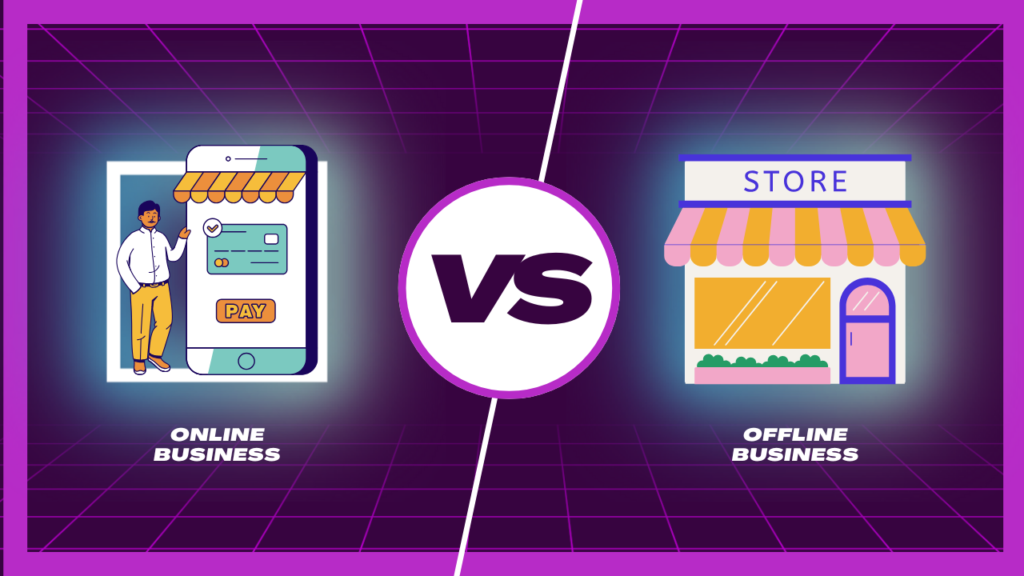In today’s rapidly evolving marketplace, entrepreneurs face the crucial decision of choosing between online and offline business models. Each has its unique characteristics, advantages, and challenges. Understanding these differences can help business owners make informed decisions that align with their goals and resources.
What is an Online Business?
An online business operates primarily on the Internet. This model includes e-commerce stores, digital services, online courses, and subscription-based platforms. Businesses can reach a global audience, allowing them to scale quickly and efficiently.
Advantages of Online Business:
- Lower Overhead Costs: Online businesses typically have reduced expenses since they don’t require physical storefronts. This can lead to increased profit margins.
- Wider Audience Reach: The internet allows businesses to market and sell products to customers worldwide, providing access to a larger customer base.
- 24/7 Availability: Online businesses can operate around the clock, allowing customers to shop or engage with services at any time.
- Data Analytics: Online businesses have access to various analytics tools that help track customer behavior, enabling targeted marketing and informed decision-making.
- Flexibility: Entrepreneurs can run online businesses from anywhere, offering the freedom to work remotely.
Disadvantages of Online Business:
- High Competition: The online marketplace is saturated, making it challenging to stand out and attract customers.
- Technical Challenges: Managing an online presence requires technical knowledge in areas like website development, digital marketing, and cybersecurity.
- Dependence on Technology: Online businesses rely heavily on technology, making them vulnerable to technical issues, cyberattacks, and server downtime.
- Customer Trust Issues: Some customers may hesitate to purchase from online businesses due to concerns about security and product authenticity.
What is an Offline Business?
An offline business operates in a physical location, such as retail stores, restaurants, and service providers. These businesses rely on face-to-face interactions and traditional marketing methods.
Advantages of Offline Business:
- Personal Interaction: Offline businesses offer direct customer interaction, fostering trust and building relationships that can lead to repeat business.
- Tangible Experience: Customers can physically see, touch, and try products, which can enhance their shopping experience and satisfaction.
- Local Market Focus: Offline businesses can cater specifically to local markets, making them more relevant to their community’s needs.
- Less Reliance on Technology: Offline businesses may require less technical expertise, allowing entrepreneurs to focus on other aspects of their operations.
Disadvantages of Offline Business:
- Higher Overhead Costs: Physical locations come with expenses such as rent, utilities, and maintenance, which can strain profit margins.
- Limited Reach: Offline businesses are generally restricted to local customers unless they invest in extensive marketing and distribution channels.
- Operating Hours: Physical stores typically have set hours of operation, limiting customer access and potential sales.
- Inventory Management: Offline businesses may face challenges in managing inventory and stock, leading to potential losses.
Key Considerations for Entrepreneurs
When deciding between an online and offline business model, consider the following factors:
- Target Audience: Identify where your target customers are most likely to engage with your products or services. Research their shopping habits and preferences.
- Budget: Assess your financial resources and determine which model aligns with your budget. Consider initial setup costs, ongoing expenses, and potential revenue streams.
- Business Goals: Define your long-term business objectives. Do you want to build a global brand or focus on local community engagement?
- Skills and Resources: Evaluate your skills and resources. Are you comfortable with technology, or do you prefer face-to-face interactions?
- Market Trends: Stay informed about industry trends and consumer behaviors, as they can influence the success of your chosen model.
Conclusion
Both online and offline businesses offer unique opportunities and challenges. The choice between the two depends on various factors, including your target market, resources, and business goals. Many successful entrepreneurs adopt a hybrid approach, combining both models to maximize reach and enhance customer experiences. By carefully considering the advantages and disadvantages of each, you can make a more informed decision that aligns with your vision for success.
